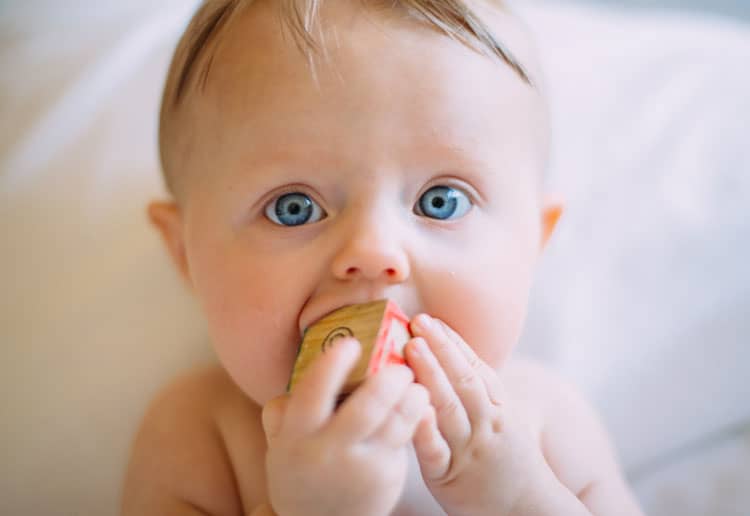We love those gummy baby smiles, but just like midnight feedings they don’t last. While it can be a fussy and uncomfortable time for your baby, new teeth mean your child is preparing for solid foods and life beyond the newborn stage.
Drool-soaked clothes? Sleepless nights? You’ve got this! Keep reading to answer the question, ‘Is my baby teething?’ and what you can expect when your baby starts, along with some ways to help your baby through the discomfort.
When do babies start teething?

Some babies start teething early, around three months of age. But the average age that teething begins is six months. Keep in mind that each baby is unique and it’s completely normal for babies to teeth later than that. As a general rule, baby teeth start to emerge between 4–15 months. You can expect your toddler to have a full set of 20 primary teeth by age three.
Did you know that baby teeth emerge in a predictable pattern? Check out this order of appearance diagram from the American Dental Association to learn more.
How do you know when a baby is teething?

If you’ve talked to other parents or read through online comment feeds, you know that teething signs and symptoms vary greatly. Some babies will hardly show any indication of teething while others will drool profusely, wake during the night, and be uncharacteristically fussy. There’s no way to predict how your newborn will take to teething, so just relax, trust the process, and know that it doesn’t last forever!
Is my baby teething?

Here are the most common signs of teething:
1. Trouble sleeping
You may be asking yourself “Is my baby teething” if their sleep habits have changed for the worse. This can be a hard one to identify because there are so many other factors that can contribute to a change in sleep patterns. But this is one telltale sign that your baby may be teething.
2. Irritability, fussiness, crankiness
If your baby’s temperament has changed from sunshine and rainbows all of a sudden to irritable, fussy, and cranky; you may have a teething baby in your midst. You know your baby better than anyone else. If you are witnessing these mood changes and are asking yourself “Is my baby teething,” go with your gut instincts!
3. Change in or loss of appetite—or a nursing strike
A change in eating habits can be a warning sign that something is not quite right. It’s always recommended to check in with your pediatrician and ask is my baby teething, or is something else going on that needs attention.
4. Excessive drooling
Who knew a little human could have so much saliva? A teething baby is often drenched from the nose down to their belly buttons in drool. This is a dead giveaway that you may have a teething baby.
5. Biting and chewing more than usual
Is my baby teething or do they just love to inflict pain on anything that goes in their mouth? They’re teething, don’t worry!
6. Pulling on ears, rubbing chin and cheeks
Babies often pull on their ears, or rub around their face when they are experiencing pain from teething. Keep an eye out for this common symptom.
7. Swollen or inflamed gum tissue
Peek inside your baby’s mouth and see if they have swollen gums. Sometimes you can see little bumps where the teeth are trying to come up from.
Related articles:
- How To Be A Good Parent
- Best Sleep Schedules for Infants & Toddlers
- Baby Gear Rentals: How to Get Started
Baby teething remedies

Yes, there is something you can do! If you suspect your little one is working on some new teeth, try one of these remedies:
1. Apply cold and pressure
If your baby is gumming everything in sight (including the edge of the coffee table) offer them something cold to chew on. We love the simplicity of a clean finger, wet washcloth, or frozen washcloth for babies that aren’t yet eating solid foods. For babies who are just starting to explore food, a piece of frozen banana in a baby food feeder can offer relief. For older babies, popsicles, frozen smoothie pops, and frozen bananas on a stick can offer relief and distraction from the pain of teething.
2. Offer a teething toy or necklace
Save your board books and offer a teething ring or toy. We love the non-toxic, silicone options from Sweet Tooth. If you prefer a natural material, Calmies makes wonderful teethers from sustainably harvested, all-natural rubber. And as we’ve mentioned before on this blog, we love this all-natural wood teether from Palumba.
For older babies, an amber teething necklace is not only adorable but can also help sooth your babies gums. And don’t forget about teething necklaces for mom, there are tons of cute options to fit your style and provide baby something to reach for when the need to chew arises. Check out the variety of teething necklace styles on Etsy.
3. Try a natural, herbal remedy like chamomile
Katie Wells of Wellness Mama recommends using chamomile to relax your baby’s nerves and soothe the pain of teething. You can make a weak chamomile tea, freeze it in an ice cube tray, and then offer baby a frozen chamomile cube wrapped in a washcloth or cloth bag. Be sure to secure the cube so that it doesn’t pose a choking hazard.
If you like using tinctures or essential oils, these can also be applied to the gums for a soothing effect. We’re not medical professionals or essential oil experts, so please do your own research and consult a trusted healthcare professional before using these products on your baby.
4. Over the counter pain relief options for teething
There are a number of topical products on the market that claim to soothe the gums and provide relief from teething pain. Infant pain relievers like acetaminophen (the active ingredient in Tylenol) or ibuprofen (the active ingredient in Motrin) are often recommended for teething babies. Do your own research and talk to a trusted healthcare professional before offering over-the-counter pain products to your baby.
5. Massage
Gently rubbing your baby’s gums may also provide relief. Wash your hands first, and then offer them a finger or knuckle to chew on. Apply pressure and rub in a circular motion to see if they like it. Do so at your own risk though. Those little gums may still bite down with strong force.
6. Keep Baby Comfortable and Dry
Sometimes the best thing you can do is to just not make things worse. Be sure to wipe your baby’s face and chin often to keep them from developing a rash from saliva. Be aware of diaper rash since an increase in saliva production during teething may lead to more acidity in your baby’s urine and feces. Clean teething toys regularly to reduce the chance of your baby getting sick from germs. Teething biscuits and cold or frozen foods should only be offered to children who are already eating solid food.
7. Wear Your Baby!
This is an easy one since your baby may already be insisting on being held more. When you’ve tried all the other remedies and your baby still seems fussy; the best way to comfort them may be to simply hold them. Being in your arms can be so soothing and it may be the only thing that makes them feel better. Wearing your baby can provide them the comfort and security they need in their time of pain and stress.
8. Distraction
When all else fails, help your baby focus on anything else other than the throbbing in their mouth. Go out of the house and go for a walk in the park where there are lots of interesting things to see, hear, smell, and touch. Distract them with playing or swinging or listening to music. Sometimes all you can do is change the subject and hope for the best.
More resources for teething and dental care:

- For a primer on teething, this info from the American Dental Association is helpful.
- For more information about dental care, oral health, and your child, check out this guide from the American Academy of Pediatrics.
- For more teething tips, read Teething: Tips for soothing sore gums from the Mayo Clinic.
- We also love the all-natural teething relief suggestions and home remedies from Wellness Mama and Mama Natural.

Kathy is a freelance writer, an Independent Quality Provider with BabyQuip and the mother of a very active one-year-old boy. When she’s not changing diapers, developing engaging content for clients, or helping families travel with little ones, she enjoys reading, gardening, yoga, and naps.



Chamomile tea worked wonders for us. We gave our son just a little before bed to relax him. Also, he didn’t care for frozen teething rings so we kept them in the fridge so they would be slightly chill.
There are mixed info on Amber Teething Necklaces. But I swear by them. It’s recommended to leave of for naps, sleep and bathtime. My first was droooing and screaming sooo much. I put one on and he never drooled from teeth or cried in pain again. I NEVER knew when he had a tooth coming in. It may be voodoo but I will take it. Again do your own research.
Any mamas have suggestions for how to treat chin rash from drooling so much?
When I thought my baby was teething he actually had an abscess. It didn’t end up being serious but I thought his gums were just really swollen from a tooth coming in. Just something to watch for.
I thought every odd behavior or temper tantrum was due to teething. I was using that excuse for almost 8 months until my baby finally got his first tooth, haha!
We had really good luck with a teething roller made with essential oils and then rubbed along the jawline. It made a huge difference for our little one!
I’m always wondering! I had no idea that chin rubbing is a sign and this is something that my little man does often! He’s in the thick of molar break throughs as we speak, and yes his chin is totally red and irritated! Thanks for mentioning this!
I’m sending this to my best friend right now! Teething babies are so sad!
Teething can be so different from one child to the next; but we loved the necklaces and chilled teether toys for both kids.
I am lucky that my baby was an easy teether. We loved the teething necklaces and frozen teether toys.
Me too, I got lucky with my little guy. Teething barely phased him:-)